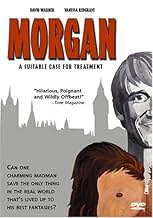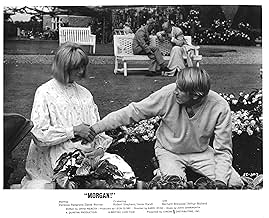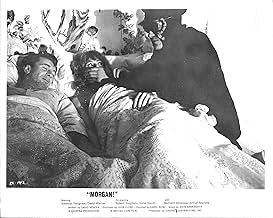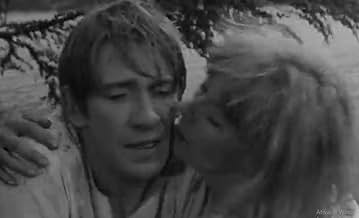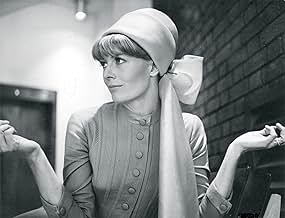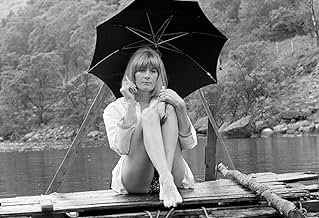IMDb-BEWERTUNG
6,5/10
2174
IHRE BEWERTUNG
Füge eine Handlung in deiner Sprache hinzuAfter his wife leaves him for his former best friend, a failed London artist begins his descent into madness in trying to win her back.After his wife leaves him for his former best friend, a failed London artist begins his descent into madness in trying to win her back.After his wife leaves him for his former best friend, a failed London artist begins his descent into madness in trying to win her back.
- Für 2 Oscars nominiert
- 4 Gewinne & 12 Nominierungen insgesamt
Angus MacKay
- Best Man
- (as Angus Mackay)
Jack Armstrong
- Guest at Wedding Reception
- (Nicht genannt)
Bernard Barnsley
- Workman
- (Nicht genannt)
Empfohlene Bewertungen
I've always had something of an ambivalent attitude towards the British "Swinging London" films of the 1960s: sometimes I enjoy their creative technique and anything-goes approach, while other times I find their brashness exasperating and extremely dated. Actually, MORGAN is now among the films I've revisited the most among them (more by accident than design) which has led me to toy with the idea of compiling a list of titles from that era - comprising above all films I've watched only once, or not at all, but also those which I haven't checked out in ages (some of which are in my endless "DVDs To Watch" pile).
Anyway, the film itself is certainly one of the most engaging of the lot: basically an update of the typical Hollywood 'screwball comedy' formula, with one member of a divorced couple disrupting the new marriage plans of the other, though here we don't get the conventional happy ending. Reisz was, along with Lindsay Anderson and Tony Richardson, one of the founding members of the "Free Cinema" movement; though he started at the very top with Saturday NIGHT AND Sunday MORNING (1960), the rest of his career was rather spotty with MORGAN being perhaps its closest in quality - even if the unflinching realism of the former had, by this time, given way to irreverent comic fantasy!
While the plot is somewhat thin and the lead character's pranks to reclaim his wife become repetitive, the film's hectic pace never wavers; stylish, amusing (particularly when dealing with Morgan's Communist background and his obsession with gorillas!) and bolstered by John Dankworth's playful score, it's delightfully enacted by the three principals - David Warner (the role of his life), Vanessa Redgrave (the recipient of many accolades, including a surprising Best Actress Oscar nomination) and Robert Stephens - none of whom are typically associated with slapstick (though David Mercer's script also offers perceptive comments about the painful consequences of a broken marriage).
Anyway, the film itself is certainly one of the most engaging of the lot: basically an update of the typical Hollywood 'screwball comedy' formula, with one member of a divorced couple disrupting the new marriage plans of the other, though here we don't get the conventional happy ending. Reisz was, along with Lindsay Anderson and Tony Richardson, one of the founding members of the "Free Cinema" movement; though he started at the very top with Saturday NIGHT AND Sunday MORNING (1960), the rest of his career was rather spotty with MORGAN being perhaps its closest in quality - even if the unflinching realism of the former had, by this time, given way to irreverent comic fantasy!
While the plot is somewhat thin and the lead character's pranks to reclaim his wife become repetitive, the film's hectic pace never wavers; stylish, amusing (particularly when dealing with Morgan's Communist background and his obsession with gorillas!) and bolstered by John Dankworth's playful score, it's delightfully enacted by the three principals - David Warner (the role of his life), Vanessa Redgrave (the recipient of many accolades, including a surprising Best Actress Oscar nomination) and Robert Stephens - none of whom are typically associated with slapstick (though David Mercer's script also offers perceptive comments about the painful consequences of a broken marriage).
Although a classic cult film of the 60's, this film, when studied properly, has its definite faults.
David Warner is one of my favourite actors. He often appears in minor roles nowadays and gives the leads great support with his excellent performances, and his position down the cast list does enable him to be offered a wide range of characters. However, this has caused him to be one of the most underrated actors around today and unlike his English equivalents (John Hurt, Ian Holm, etc.) he has never been really appreciated enough by those outside the UK. It was with great interest, therefore, that I was given a chance to see one David Warner's first films after "Tom Jones" (1963), "Morgan, A Suitable Case for Treatment," a film adapted from a television play by writer David Mercer, in which Warner takes for the only time in his career, the definite title role in a movie, starring alongside then-first-timer Vanessa Redgrave.
Warner plays Morgan Delt, a barely sane man who has just had a divorce from his beautiful wife, Leonie (Redgrave), much to his secret dismay. As a consequence, Morgan begins to sabotage Leonie's second marriage to his former-best-friend Charles Napier (Robert Stephens), attempting various types of distractions which are characteristic of the man himself. He plays sounds from records to disturb the couple at dinner, re-wires Leonie's house, dresses up as a gorilla, and even plants bombs during a brief visitation from Leonie's mother. Soon he begins to dream, mostly about his obsession with gorillas but also of his mock execution, he believes himself to not only to be insane but also illegal.
This depiction of madness, however, barely works at all, the adaptation of this story from television to screen being probably the main reason for it. The acting is fine, Redgrave is brilliant and Warner, perfectly cast for once in his career, is superb, the supporting cast are also impressive, including a nice cameo from actress Irene Handl as Morgan's mother, it's just that the film doesn't quite work. "A Suitable Case for Treatment" does have some hilariously funny moments which are highly memorable in fact, but the film as a general whole doesn't succeed. See it if you can, but expect some disappointment.
Warner plays Morgan Delt, a barely sane man who has just had a divorce from his beautiful wife, Leonie (Redgrave), much to his secret dismay. As a consequence, Morgan begins to sabotage Leonie's second marriage to his former-best-friend Charles Napier (Robert Stephens), attempting various types of distractions which are characteristic of the man himself. He plays sounds from records to disturb the couple at dinner, re-wires Leonie's house, dresses up as a gorilla, and even plants bombs during a brief visitation from Leonie's mother. Soon he begins to dream, mostly about his obsession with gorillas but also of his mock execution, he believes himself to not only to be insane but also illegal.
This depiction of madness, however, barely works at all, the adaptation of this story from television to screen being probably the main reason for it. The acting is fine, Redgrave is brilliant and Warner, perfectly cast for once in his career, is superb, the supporting cast are also impressive, including a nice cameo from actress Irene Handl as Morgan's mother, it's just that the film doesn't quite work. "A Suitable Case for Treatment" does have some hilariously funny moments which are highly memorable in fact, but the film as a general whole doesn't succeed. See it if you can, but expect some disappointment.
Say "1960's British comedy movie" and already some people are thinking of impossibly mod dialogue, dated images and an obsession with pop and quick sex. This movie shouldn't work but it does. Try pitching a concept of an insane young communist obsessed with gorillas and unable to come to terms with the break up of his marriage to today's Hollywood executives and you'd get thrown out of their offices. But it is genuinely funny and sad, it's well directed and you can't speak highly enough of David Warner in the lead role.
I've always thought that Warner is at his best when his seemingly unsympathetic characters engender some sympathy. The retarded man in "Straw Dogs", the jaded Captain in "Cross of Iron", the put apon conscript in "The Bofors Gun" to name but a few. Morgan is his ultimate portrayal of this type of character.
I've always thought that Warner is at his best when his seemingly unsympathetic characters engender some sympathy. The retarded man in "Straw Dogs", the jaded Captain in "Cross of Iron", the put apon conscript in "The Bofors Gun" to name but a few. Morgan is his ultimate portrayal of this type of character.
In 1966 when I lived in London I fully expected to see this movie. Many of my friends, especially the girls, were raving about it. Funds diverted to beer, or girls, deprived me of the chance. So it has taken me nearly forty years to actually see it. Thoroughly of the time, and yet it must have seemed so radical even then. I watched it as a chaser to Alfie (Michael Caine) and it was interesting to compare the styles of two icons of British female acting, Redgrave and Asher, in one evening. Both movies dealt with serious and potentially unattractive issues; adultery, abortion, promiscuity and mental illness and injected enough humor into the screenplay to keep ones attention the while. I am prompted to revisit "Up the Junction" and " A Taste of Honey" with Rita Tushingham, another sixties icon.
A film that acheives what it sets out to be. It is an immature and unreasonable storyline that takes no account for anyones feelings but those of our hero, Morgan... But 1966 was a time of big brush strokes, not subtle pointers. Most of the situations and characters are cardboard and stereotypical, but done with a sense of style and flair that allows you not to get bogged down in it all. When at the end of the film, the seemingly battered and beaten Morgan still has the clenched fist of rebellion, it's time for a hot cocoa and then off to bed clutching Das Kapital in your rebellious mitts, with a wistful smile on your face for the simple values of yesteryear, when it was good versus evil. I gave it 9 0ut of 10. Very watchable and great fun
Wusstest du schon
- WissenswertesVanessa Redgrave's Best Actress Oscar nomination for this movie coincided with sister Lynn Redgrave's similar nomination for Georgy Girl (1966). Such a coincidence had occurred only once before when sisters Joan Fontaine and Olivia de Havilland respectively vied for the Best Actress Oscar for Verdacht (1941) and Erwachen in der Dämmerung (1941).
- PatzerCrew reflected in the window of the car that Leonie gets into at the start of the film.
- Zitate
Morgan Delt: [to Leoni] Do you really want little Napiers growing inside you?
- VerbindungenEdited from King Kong und die weiße Frau (1933)
Top-Auswahl
Melde dich zum Bewerten an und greife auf die Watchlist für personalisierte Empfehlungen zu.
- How long is Morgan!?Powered by Alexa
Details
- Laufzeit1 Stunde 37 Minuten
- Farbe
- Seitenverhältnis
- 1.66 : 1
Zu dieser Seite beitragen
Bearbeitung vorschlagen oder fehlenden Inhalt hinzufügen



